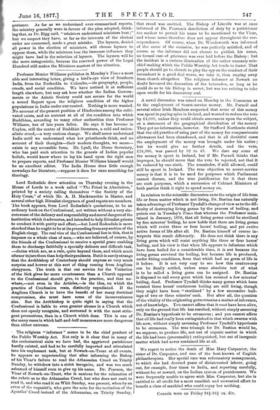In relation to the scientific discussion as to the origin
of life from life or from matter which is not living, Dr. Bastian has naturally taken advantage of Professor Tyndall's change of view as to the dif- ficulty of destroying living germs by the process of boiling, and points out in Tuesday's Times that whereas the Professor main- tained in January, 1876, that all living germs could be sterilised by five minutes' boiling, he now holds that there are living germs which will resist three or four hours' boiling, and yet evolve active forms of life after all. Dr. Bastian himself of course in- terprets this result differently. He does not think there is any living germ which will resist anything like three or four hours' boiling, and his -view is that when life appears in infusions which have been boiled for a considerable time, it is not because the living germs survived the boiling, but because life is produced, under fitting conditions, from that which had no germ of life in it before. It is not very easy to see how this controversy can be finally settled, unless some absolute test of what is to be called a living germ can be assigned. Dr. Bastian is disposed to call every germ which has resisted a few minutes' boiling, dead. Professor Tyndall thinks many germs which have resisted three hours' continuous boiling are still living, though, they might have been " sterilised " by a few successive boil- ings of two or three minutes' each. But after all, the question of the vitality of the originating germ remains a matter of inference, not of knowledge. You cannot affirm that it must have been alive, only on 'the ground that life has resulted, without simply assuming Dr. Bastian's hypothesis to be erroneous ; and you cannot aiSrin that all life had really been extinguished in that which swarms with life now, without simply assuming Professor Tyndall's hypothesis to be erroneous. The true triumph for Dr. Bastian would be, we suppose, to produce life, not out of organic matter in which the life had been (presumably) extinguished, but out of inorganic matter which had never contained life at all.


































 Previous page
Previous page